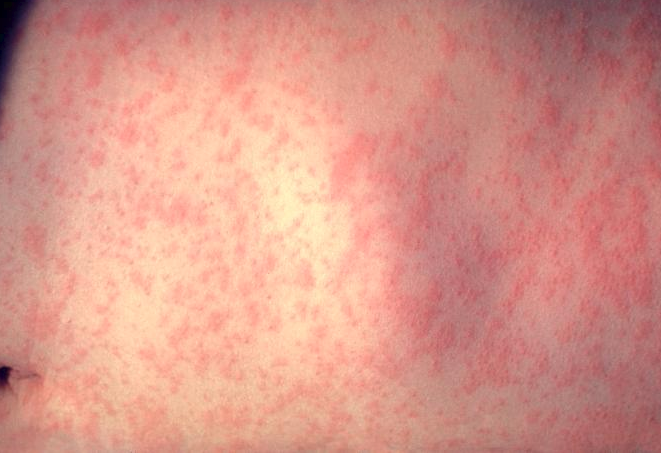New Hampshire Department of Health and Human Services Issues Update about Measles in New Hampshire
Concord, NH – The New Hampshire Department of Health and Human Services (DHHS), Division of Public Health Services (DPHS) has issued an update in the ongoing investigation into potential exposure to measles in the Keene area.
DHHS has received additional laboratory test results that suggest that the patient’s symptoms were not due to infectious measles, and the public is not currently at risk for measles from this individual.
This new laboratory testing indicates the patient’s symptoms were likely due to a vaccine reaction from the live-attenuated MMR vaccine. Therefore, DHHS is suspending additional public health interventions. There is no contagious measles known to be circulating in the community.
Last week, DPHS identified a New Hampshire resident who had been diagnosed with measles. Following consultation with the Centers for Disease Control and Prevention (CDC), NH DPHS initiated necessary early action to protect the public’s health, including an investigation to identify exposed individuals who were at highest risk of getting and spreading measles.
With information that the child had recently been vaccinated several days before the start of his/her symptoms, DPHS requested urgent specialized laboratory testing to identify the measles strain causing the initial positive laboratory test.
“Measles is very contagious so this new laboratory information indicating that the child’s symptoms are not from contagious measles is good news,” said Dr. Benjamin Chan, State Epidemiologist. “This situation, however, serves as an important reminder that with measles circulating at unprecedented levels nationally, we all need to make sure we and our family members are protected and vaccinated against measles.”
The MMR vaccine is a live-attenuated vaccine (made using a weakened virus like some influenza vaccines) intended to build up a person’s immunity. Like all vaccines, there can be side effects associated with the vaccine. Most vaccines, including the MMR vaccine, can cause a limited local injection site reaction. About 5% of individuals vaccinated with the MMR vaccine develop a fever and rash reaction.
These reactions happen because the body is responding to the vaccine by making protective virus-fighting antibodies against the harmless vaccine virus. More serious or extensive reactions that resemble a real (i.e. wild-type) measles virus infection, as was seen in this child, are very rare. The scientific literature has found no confirmed cases of human-to-human transmission of the vaccine strain of the measles virus.
A public inquiry phone line is still available from 8am – 4pm by calling 603-271-9461, or toll-free for NH residents at 1-800-852-3345 ext. 9461. Anyone with questions or concerns are encouraged to call.
Measles is caused by a virus that is passed from person-to-person through the air when someone with the disease sneezes, coughs, or talks. The virus can remain infectious in the air for up to two hours after an infected person leaves the area. It is very easy for individuals who have not received the measles vaccine to contract it from someone else. The incubation period for measles from the time of exposure is 7 to 21 days, typically 2 weeks. Symptoms of measles infection usually begin with high fever, cough, runny nose, and conjunctivitis several days prior to developing a body rash.
In order to protect the health of the community and individuals who may not be able to receive the vaccine, NH DHHS recommends that all people review their vaccination status with their healthcare providers to ensure adequate immunity to measles. The measles vaccine (MMR vaccine) is very safe and effective, and approximately 99% of individuals who receive two doses of the vaccine develop immunity to measles.
For more information about measles prevention, download the DHHS Measles Fact Sheet atwww.dhhs.nh.gov/dphs/cdcs/documents/measles.pdf, visit the DHHS Immunization Program webpage at www.dhhs.nh.gov/dphs/immunization/index.htm, and visit the Centers for Disease Control and Prevention website at www.cdc.gov/measles/index.html.





